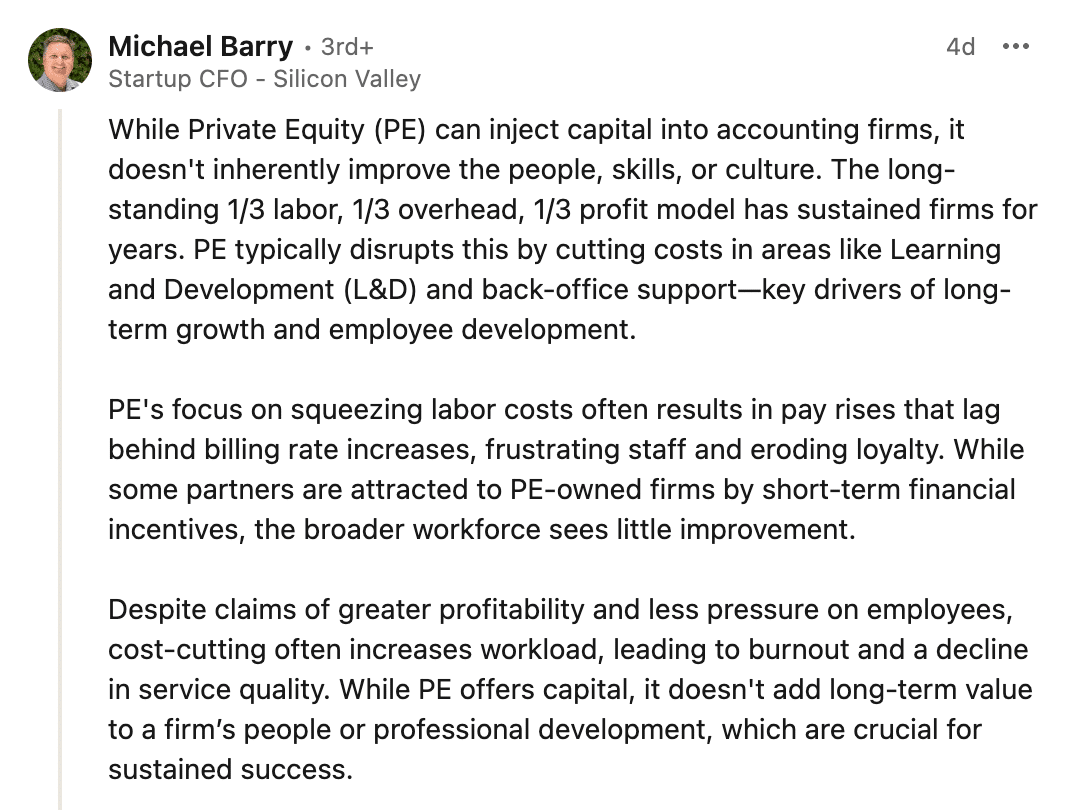As an accounting firm owner, you may have received calls from private equity investors to show interest in your practice. You’re not alone.
This trend started in 2021 when TowerBrook Capital Partners announced their investment in EisnerAmper LLP, one of the largest accounting firms in the U.S. This acquisition marked the first major private equity investment in the accounting industry.
Since then, more private equity investors have targeted the accounting sector, providing firms with the financial muscle to scale their operations. But why the sudden interest?
“The word has gotten out that accounting firms are great investments,” says Alan Koltin, CPA, CGMA, and CEO of Koltin Consulting Group.
Factors like stable cash flows, long-term client relationships, fragmented markets, and potential for growth through technology have positioned the accounting industry as an attractive target for private equity investors.
This trend shows no signs of slowing down. In this article, we’ll explore how private equity works, its impact and potential challenges on accounting firms, and why you should care.
What is Private Equity and How Does it Work?
Private equity (PE) is a form of investment where individuals or private firms provide capital to private companies — those not traded on a stock exchange — with the aim of growing and selling them for profit.
Here’s how it works: PE firms raise funds from institutional investors such as pension funds, endowments, and wealthy individuals, buy controlling stakes in companies, and then employ various strategies to grow their market value over a set period.
When the investment company becomes profitable, they then exit by selling their stake or going public through IPO, typically after five to seven years.
Unlike other forms of investment, such as venture capital and hedge funds, PE focuses on established companies.
Impact of Private Equity on Accounting Firms
PE investments are transforming accounting firms in different ways. While they provide much-needed capital for growth, innovation, and scaling operations, they also impact various aspects of a firm, including its leadership, culture, employees, and clients. Let’s take a closer look at some of these impacts of PE on CPA firms.
Increased resources and financial stability
Accounting firms that don’t innovate and grow risk falling behind their competitors. Scott Scharf, Founder of Scharf Consulting LLC, shares his opinion:
My big thing is that how do firms that are either aren’t ready or choose not to go the PE route compete with people that have all this extra cash and can hire people away and all those other things."
In other words, PE funding gives firms much-needed capital to expand their resources, allowing them to invest in talent acquisition, advanced technology, and targeted marketing strategies that drive growth.
Access to new markets and clients
Besides capital, private equity firms offer a gateway to new markets and high-value clients.
Their extensive networks and industry connections could open doors to valuable business opportunities, helping you scale your accounting practice to serve a wider range of clients.
In addition, PE firms provide funds to invest in traditional and digital marketing strategies that attract and retain high-quality clients.
Improved technology and systems
Emerging technologies like artificial intelligence, cloud computing, and automation have reshaped the accounting industry.
However, some firms still struggle to adopt these technological advancements due to financial constraints or a lack of technical expertise. That’s where private equity investment comes in.
An influx of PE funds into your firm allows you to upgrade your accounting technology and operational systems to boost efficiency, reduce turnaround time, and provide better client services.
Furthermore, automating routine, repetitive tasks allows you to focus on more high-value tasks that drive revenue.
Enhanced professional development opportunities
Imagine losing your best staff because there are no growth opportunities at your firm. This is a common challenge for many smaller accounting firms.
PE investment levels the playing field. With additional financial backing, you can provide your employees with more robust training programs and career advancement opportunities.
It can also ensure your firm offers more competitive salary and benefits, strengthening your ability to recruit and retain the best talents in the industry.
Potential Challenges
PE in accounting firms has several advantages, but it’s not without its share of challenges. Identifying them is key to establishing a successful business partnership with investors. Here are potential roadblocks to keep in mind when considering PE investments.
Changes in firm culture and values
When PE firms invest in a company, they often bring in their management teams to implement growth strategies.
These changes could lead to a more corporate management style that prioritizes profitability, which may clash with your firm’s culture, values, and direction.
Sona B. Akmakjian, CPA, Global Head of Strategic Accounting Partnerships at Avalara, expressed her concern about the potential cultural shifts PE involvement brings:
The value we deliver, the relationship we have with our clients, these are things that, in my opinion, make the profession what it is. How do we preserve that? How do we educate the PE firms about our profession and what is non-negotiable or what is sacred about our profession?"
Loss of Control
Let’s face it: no one likes to lose control of their business. But this is often the reality when a private equity firm invests. You may need to adapt to new leadership as the PE firm takes a more active role in your firm’s operations. Depending on the agreement, the private equity partner could gain substantial influence over decision-making and daily management.
Michael Barry, a startup CFO with over 20 years of experience in the finance and accounting industry, shares what an accounting firm controlled by PE looks like:
This power shift can be unsettling for firm leaders who are used to having full autonomy, potentially creating friction over the company’s direction.
To prevent this bottleneck, firm owners and PE investors must align their vision and expectations from the outset. Clear communication and mutual agreement on how the business will be run can help ease the transition and preserve the firm’s structure under new leadership.
Increased pressure to meet financial targets
PE firms often set ambitious financial targets and timelines for their investment companies. As a result, employees may face stricter performance metrics, leading to more stress and potential turnover.
It also pressures firms to meet these goals, sometimes at the expense of audit integrity, quality client service, and employee work-life balance.
So it’s up to you to balance your partner’s financial demands while maintaining your firm’s core values and client focus.
Potential for job insecurity or layoffs
Restructuring is a major part of any private equity investment. PE firms do this to meet financial goals, leading to job insecurity. Also, their efforts to reduce costs may involve automating processes, potentially making certain job roles redundant.
These uncertainties might cause employees to worry about their future, affecting morale and productivity.
As such, accounting firms must communicate openly with their workforce to maintain trust and retain their top talents.
Balancing the demands of private equity investors with the firm’s commitment to its employees is crucial for long-term success.
Lynette Patterson, a CPA who worked for an accounting firm before it was acquired by another PE backed firm shares her experience:
You may be interested in:
How to Keep Your Accounting Firm Profitable Without Losing Sleep
Why Accountants and Firms Should Care
PE investment can be a game-changer for accounting firms. However, before deciding if it’s the right move for your practice, it’s crucial to understand the potential impact of PE acquisitions on firm owners, employees, and clients.
For Firm Owners and Partners
As an accounting firm owner with hopes of growing and scaling your practice, a PE investment may be what you need to expand the business.
With the additional financial backing, you can invest in advanced technology, expand into new markets, attract high-quality clients, and hire skilled professionals—moves that accelerate business growth.
It’s also an opportunity to reduce the operational burden of running your practice. PE firms often bring in their management teams, freeing firm owners and managing partners to focus on revenue-generating activities.
However, these benefits come with risks. One major concern is loss of control. Depending on the nature of the deal, investors may influence strategic decisions, steering the firm in a more corporate direction.
This can lead to a shift in culture, where your firm’s core values give way to more profit-driven management styles. For some owners and partners, losing autonomy and their firm’s identity is a major drawback.
Diane Yetter, Founder of Sales Tax Institute, shares a similar view:
One thing I haven’t seen written about all is, are clients happy about this? Or are they worried about the impact on their relationships? Because let’s face it, this a relationship business. I don’t wanna lose my culture. I don’t wanna lose how I do business and reputation that I have. And with that kind of involvement from PE, how much do I really get to keep that?"
For Employees
What do employees in accounting firms stand to gain from a PE acquisition? For starters, PE backing means upgraded technology and infrastructure to streamline work processes and improve efficiency.
Employees also benefit from top professional training, accelerated career paths, and good salaries. These improvements make a firm a more attractive place to work.
But, with PE’s primary focus on achieving faster results, work-life balance may be compromised. The firm’s priorities could shift from providing quality service to meeting financial targets, leading to higher workloads, increased performance pressure, and elevated stress levels.
Therefore, employees must weigh the benefits of improved resources and career development against the demands of a more fast-paced work environment.
For Clients
PE-backed firms have more resources to offer a wider range of services like client accounting services (CAS). They also boast the latest tools and software, leading to improved services, accurate work, and quicker turnaround times.
However, there’s a risk that the firm’s focus might shift toward more profitable, high-margin services, a shift from the company’s culture.
Clients may feel the company will be more concerned with maximizing profits than providing personalized service and may be forced to take their business elsewhere.
As such, balancing client satisfaction with the financial demands of investors will be critical for accounting firms looking to retain their client base.
Private Equity in Accounting Firms: The Road Ahead
This much is clear: PE investment in accounting firms is here to stay. It presents both opportunities and challenges that accounting professionals simply cannot ignore.
PE backing unlocks capital for expansion, provides access to new markets and investment in technology, and offers resources needed for accounting firms to scale swiftly.
However, these benefits come with potential trade-offs, including changes in firm culture, increased pressure to meet financial targets, loss of control, and possibly layoffs. So, stay on top of PE trends and carefully weigh the pros and cons of such partnerships.
Koltin shares a similar opinion:
This is new, and it’s different. Understand that the accounting business is changing and ask if this is a better way to achieve your goals."
If you think your firm is ready for a PE investment, one way to make it more appealing to investors is to streamline operations and implement efficient systems.
That’s where accounting software like Financial Cents comes in. It’s a powerful accounting practice management software that makes running your daily operations a breeze. It offers workflow automation, AI integration, task management, firm management, and real-time collaboration features.
Whether your goal is to attract private equity investment or enhance your firm’s operations, having the right software is critical to ensure long-term success in an increasingly competitive market.
Use Financial Cents to manage your firm.








